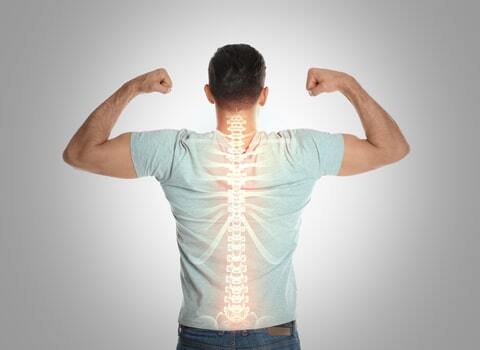
 Data Structure
Data Structure Networking
Networking RDBMS
RDBMS Operating System
Operating System Java
Java MS Excel
MS Excel iOS
iOS HTML
HTML CSS
CSS Android
Android Python
Python C Programming
C Programming C++
C++ C#
C# MongoDB
MongoDB MySQL
MySQL Javascript
Javascript PHP
PHPPhysics
Chemistry
Biology
Mathematics
English
Economics
Psychology
Social Studies
Fashion Studies
Legal Studies
- Selected Reading
- UPSC IAS Exams Notes
- Developer's Best Practices
- Questions and Answers
- Effective Resume Writing
- HR Interview Questions
- Computer Glossary
- Who is Who
The 7 Best Bone-Building Foods
In the long run, your diet will have a significant impact on the health of your bones. Eat enough of these bone-healthy foods to maintain healthy bones.
Bone health is an investment worth making. According to the National Institutes of Health, bones and teeth do more than just keep you mobile and upright; they also cushion your interior organs, provide essential minerals like calcium and phosphorus, and help you digest food.

Sadly, by the time a person reaches the age of 40, these crucial structures begin to lose bulk when the body stops replenishing old bone. If you don't take measures to prevent the further nutritional loss, it might harm your independence and mobility and raise your chance of acquiring conditions like osteoporosis.
Bone health is affected by diet and the lifestyle choices we make during a lifetime.
Including Dairy in your Diet is a Great way to get the bone-building Calcium you Need.
Milk, yogurt, and cheese are often considered bone-healthy because of their high calcium and phosphorus content. According to the National Institutes of Health, calcium is the most essential vitamin for maintaining bone health. Calcium may be found in fat-free milk and plain nonfat Greek yogurt.
It's up to you whether you choose full-fat or low-fat dairy products. A person watching their weight may wish to go for reduced-fat options.
Choose nonfat foods fortified with fat-soluble vitamins like vitamins A and D if you're trying to grow strong bones without eating more fat, as the American Council on Nutrition recommends. Fat-soluble vitamins are also lost in the fat-reduction process.
Both Magnesium and Phosphorus, Found in nuts, Contribute to Bone Health
Certain nuts include calcium, but even more importantly, they provide magnesium and phosphorus, two other minerals crucial to bone health. Magnesium aids calcium absorption and bone mineralization. However, bones rely heavily on phosphorus, with the mineral making up around 85% of your body's total mass.
Almonds are a safe pick, says Allonen, even if there are many other nut options to consider, such as walnuts, peanuts, and pecans. Almonds, in the amount of one ounce (about a handful), are rich in magnesium and supply some phosphorus.
There are Several bone-healthy Nutrients in Seeds That are Also Present in Nuts
Seeds are as nutritious as nuts since they contain the same three minerals.
In addition to providing fiber, seeds are a good source of omega-3 fatty acids. This polyunsaturated fatty acid may help decrease cholesterol and inflammation and support healthy brain and nervous system function. Moreover, walnuts contain omega-3 fatty acids.
Including chia, ground flaxseed, pumpkin, and sesame seeds in your diet. To provide just one example, one ounce of sesame seeds is rich in phosphorus and a good source of calcium and magnesium.
Try sprinkling some sesame seeds over your salad or working some chia seeds into your next baking effort to increase your seed intake.
Vitamin K, Calcium, and Magnesium are Nutrients Found in Cruciferous Vegetables That aid bone Health
Just in case you needed another excuse to load up on veggies. Cruciferous vegetables, which include dark green leafy vegetables, are rich in calcium and vitamin K, two critical minerals for bone health.
Calcium and vitamin K work together to aid in bone development. Furthermore, low vitamin K levels have been linked to an increased risk of osteoporosis and bone fractures.
Spinach, turnip greens, kale, cabbage, and broccoli all fall within the category of cruciferous vegetables.
One cup of cooked kale provides a good amount of vitamin K and some calcium. This leafy green, which can be used in various ways, is rich in vitamin A, which is beneficial to the health of your bones. If you're not a fan of kale, try broccoli instead: One cup of this cruciferous vegetable, once boiled and diced, is rich in bone-strengthening calcium and magnesium, and it is also a fantastic source of vitamin K.
Beans are a Superfood Plant Rich in Nutrients That are Good for your Bones
Bone-building minerals like magnesium, calcium, and phosphorus may be abundant in black beans, edamame, pinto beans, and kidney beans.
In addition, people on a plant-based diet may benefit from beans' high fiber and protein content. A plant-based diet, which minimizes animal goods like meat and dairy and boosts plant foods like vegetables, does not negatively impact bone health, contrary to common assumptions. An increased incidence of bone fractures has not been linked to veganism or other plant-based diets when enough calcium intake is maintained. Calcium intake for adults ranges from 1,000mg to 1,300mg daily, with individual needs fluctuating based on sex and developmental stage.
Consuming beans and other plant foods may help you meet your calcium needs and supply other essential minerals. One serving of black beans provides 84mg of calcium and is also rich in magnesium and phosphorus. Furthermore, they contain plant protein and are a great source of fiber.
Supply of Fatty Fish Mineral Essential for Strong Bones
Vitamin D is best obtained via sunlight, although fatty foods like salmon, tuna, and rainbow trout may help make up the shortfall.
Vitamin D sometimes called the "sunshine vitamin," is fat-soluble and essential for healthy bone development and remodeling. Mainly, it facilitates calcium absorption in the intestines. Nevertheless, approximately half of everyone globally needs to improve in this vital component due to inadequate sun exposure.
While sun exposure helps stimulate vitamin D synthesis, getting the recommended amount may be difficult depending on your skin type and geographic location. Too much sun exposure has been linked to an increased risk of skin cancer. Thus we should instead look to dietary sources of vitamin D. Particularly, an adult's vitamin D intake should be 20 mcg or 800 IU.
One of the finest nutritional sources of vitamin D is fatty fish. You can get a lot of vitamin D from a 3.25-ounce can of salmon or from an ounce of fresh smoked tuna.
Calcium, Which is Excellent for your Bones, is Abundant in Fortified Juices and Whole-grain Cereals
When calcium and vitamin D are added to other meals, they help compensate for the lack of dairy when the body rejects it. In fortified meals, such as cereal and juice, calcium content may exceed leafy greens like kale.
Cereals like Complete Raisin Bran, which include calcium and are fortified with vitamin D, are just one example. In addition, the calcium and vitamin D content of one 8-ounce container of calcium-fortified orange juice is relatively high.

